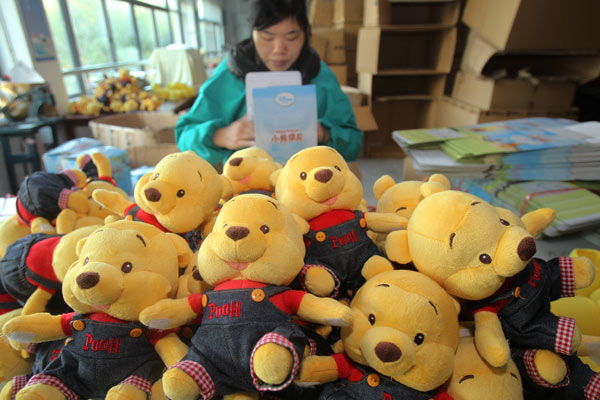

 |
|
A worker packages toys for export at a factory in Nantong, Jiangsu province. Average annual export growth slowed to 9.4 percent from 2008 to 2012, according to commerce officials. Provided to China Daily |
There's little cause for optimism about China's exports in 2014, because demand in both developed and developing countries is growing too slowly to boost purchases of the nation's products, a commerce official told China Daily.
Meanwhile, rising domestic costs are eroding China's traditional competitive advantage in prices, forcing the government to "fight hard for steady trade growth" in the coming year.
"Concerning foreign trade next year, China is facing a difficult or very difficult outlook. In other words, we have to work hard for steady growth," Song Lihong, deputy director-general of the Comprehensive Department at the Ministry of Commerce, said in an exclusive interview.
"In past years, when the world economy was doing well, China's foreign trade expanded rapidly and even outpaced the overall growth of world trade. But this time around, the recovery in developed economies or in the world economy as a whole didn't have the usual impact on growth in our foreign trade.
"The divergence shows that our traditional competitive advantage is ebbing, not to mention that the world economic recovery is fragile. As to our exports next year, it's hard to say anything optimistic," Song said.
He added that the government's commitment to steady trade growth in 2014 "must be accompanied by an improving trade structure."
Long Guoqiang, a researcher at the Development Research Center of the State Council, said that developed economies are seeing a steady recovery, but their appetite for Chinese products is weakening.
"The United States recovery is based on its monetary stimulus and the improvement of the real estate sector, while Japan's economic improvement came from currency devaluation, which benefits its own exports.
"What's more, other developing economies will pose more competition for Chinese businesses in developed markets. China's exports in 2014 will not see a significant improvement from this year," Long said.
In the January-November period, China's foreign trade rose 7.7 percent year-on-year to $3.77 trillion. Exports were up 8.3 percent to $2 trillion, and imports rose 7.1 percent to $1.77 trillion, yielding a trade surplus of $234.15 billion, according to the General Administration of Customs.
The spokesman for the Commerce Ministry, Shen Danyang, said on Wednesday that exports in December will maintain "good momentum", but exporters who had been surveyed remained "cautious" about the near future.
China is the world's largest exporter and second-largest importer. Steady export growth not only supports the employment of millions of workers, it also provides the necessary room for the government to restructure the economy away from exports and investment and toward consumption.
During last week's Central Economic Work Conference, China's highest-level economic meeting, the government vowed to support the role of exports in next year's economic growth.
While retaining the nation's traditional export advantages, the government also plans to enhance the influence of technology and create new comparative and competitive advantages.
Higher costs have acted as a drag on China's exports in recent years. Average annual export growth slowed to 9.4 percent from 2008 to 2012, compared with 27.2 percent from 2001 to 2008, the commerce official said, noting the contraction in global demand following the 2008 financial crisis.
"Higher costs, mainly for wages, reflect the decreasing labor supply and the improvement of workers' welfare. Chinese businesses, as well as government departments, should take an active part in the nation's export transformation. They must abandon the strategy of capturing market share with low prices and high volumes," Song said.
"Enterprises must enhance product quality and value by relying on innovation, design, marketing and improved logistics. We'll have our own transnational corporations, with a global vision and worldwide reach, if they can integrate resources across borders.
"As for the government, it should provide a favorable policy environment for the transformation of enterprises. We will enhance intellectual property rights protection to encourage innovation, and we will increase professional training and vocational education to meet the demands of the transformation.
"We will also tap the benefits of shifting manufacturing plants to low-cost central and western regions, while supporting the consumer markets in populous areas," he said.
lijiabao@chinadaily.com.cn